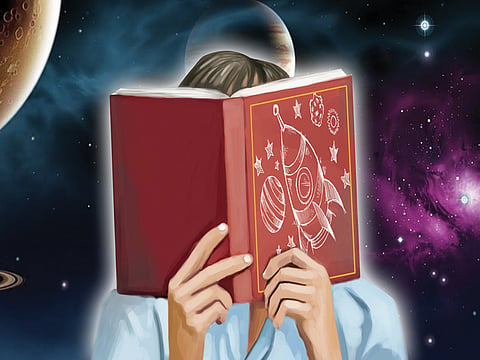Reading + science = double benefits
Regular readers as well as science buffs are aware that reading is one of the most enjoyable and fulfilling activities in one’s life

The UAE government declared 2016 as the Year of Reading and launched a series of important initiatives, including a wonderful library to be built soon, school programmes on reading, many book clubs (such as the Gulf News Book Club), the continuing and highly successful Emirates Airline Festival of Literature and many others. These big initiatives are a clear expression of the recognition of the importance of reading in human development.
The UAE government has also recently launched major initiatives in science, particularly in space, with great programmes aimed at raising the young generation in the love of science and the conviction that real and sustainable development will only be possible through science and technology and the development of a knowledge society and economy.
I believe reading and science go well together and there are ways to “double the benefits”.
The great value of reading has been widely publicised. First and foremost, reading increases a person’s vocabulary. Indeed, a recent study showed that people who read every day have two to three times more vocabulary than those who read rarely. Interestingly, the study showed that fiction enriches a person’s vocabulary significantly more than non-fiction. Another recent study showed that children who read during the summer make up for any literacy deficit they may have incurred during the school year and furthermore take a head start during the following year. The study also found that such benefits are increased when children are allowed to choose their own books to read, although educators advise that children should be encouraged to broaden their reading horizons and interests.
Other, lesser known benefits of reading fiction include reducing stress, improving creativity, increasing empathy towards others, opening one’s mind to various ideas, broadening one’s horizons (by discovering other worlds) and more.
Non-fiction increases a person’s knowledge. That’s the obvious benefit. Non-obvious but equally important advantages of reading non-fiction (sometimes referred to as “informational” reading) include the realisation that one knows very little — and thus must strive for more. Karl Popper, one of the most important philosophers of the 20th century, once said: “Our knowledge can only be finite; our ignorance must be infinite.” That can only come from someone who has read a lot. More interestingly, non-fiction reading can be fused with various hobbies, interests and causes, such as environmentalism and science.
One of my favourite books of science for the general public is Carl Sagan’s The Demon-Haunted World: Science as a candle in the dark. Written in Sagan’s famously eloquent and often poetic style, it clears up a number of misconceptions and does the best job at eradicating superstitions and false beliefs (about UFOs and many other interesting items). I recommend you offer it to a teenager this summer. Those who prefer psychology and the mind should pick up Oliver Sacks’ The Man Who Mistook His Wife for a Hat and Other Clinical Tales.
But fiction too can be merged with science, in science fiction of course, but also in novels with science themes.
Science fiction has long been a major field of literature, gaining more and more respect with authors who set high standards of writing, vision and exploration of important themes of relevance to humanity, its present and its future. Science fiction has neatly been described as a “reality simulator”. As such, it presents us with “what if” questions, scenarios that force us to consider ethical, social, technological and other dilemmas. Science fiction often asks “big questions”, such as: “At what point do we stop becoming human?” (having made too many changes); “How should we deal with aliens who have their own social and ethical norms?”; or “What limits (if any) should we place on science and technology?”
Science fiction plays a very important role in society. It helps popularise scientific developments (What is quantum computing? What are wormholes? What is gene therapy? How does cloning work? etc). It helps society get rid of various superstitions and misconceptions. It helps people prepare for change, particularly what science and technology will be bringing ...
Lastly, and as the long summer break nears, I’d like to recommend a few good science-related books for young minds. In the non-fiction category, excellent recent books include: Going Home, the mystery of animal migration, by Marianne Berkes; How the Meteorite Got to the Museum, by Jesse Hartland; Mission: Mars, by Pascal Lee; and (for older teens) The Sixth Extinction, an unnatural history, by Elizabeth Kolbert. In the fiction category, wonderful recent science-themed novels include: Tanner Turbeyfill and the Moon Rocks (a science adventure for children), by Anna Browning; Doomed (about computer viruses), by Tracy Deebs; and Project Neptune (about a group of genetically engineered children), by Polly Holyoke.
Regular readers know that reading is one of the most enjoyable and fulfilling activities in one’s life. Science buffs know how much satisfaction one gets from learning about and understanding this or that phenomenon of nature and of the universe. Putting the two together, whether through fiction or nonfiction, must be the ultimate pleasure of the mind. I wish you a great Year of Reading and science.
Nidhal Guessoum is a professor of physics and astronomy at the American University of Sharjah. You can follow him on Twitter at: www.twitter.com/@NidhalGuessoum.



